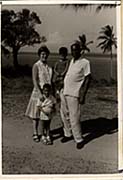

Oberlin will honor the "father of Mozambican independence" with a recognition ceremony this weekend.
A coalition of Oberlin departments and offices is sponsoring a conference today and Saturday to honor the late Dr. Eduardo Chivambo Mondlane (OC '53), who was assassinated in a bomb explosion in Dar-es-Salaam in 1969. "The Independence Struggle and Rebuilding Mozambique: Honoring Eduardo Chivambo Mondlane 53" was organized by Emeritus Professor of Sociology Albert McQueen.

Dr. Leonardo Santos Simao, Minister of Foreign Affairs and Cooperation of the Republic of Mozambique, will give the keynote address this evening at the First Church of Oberlin. Mondlane's wife, Janet, and three children will also attend the conference.
The address will be followed by a symposium and presentation on
Saturday about Mondlane and the politics of his fight for Mozambique's liberation, as well as general discussion about the continuing reconstruction of Mozambique after nearly three decades of war.
"We are very excited that the family will be here," said Yakubu Saaka, professor of African American Studies. "Not only do we teach about Mondlane in the context of African liberation, but we're also very happy that he's an alum and that this son of Oberlin could go so far."
Mondlane's life does indeed read like a long list of awe-inspiring achievements. Born in 1920 in Portuguese East Africa, Mondlane was the fourth of 16 sons of the chieftain in the Tsonga tribe, a division of the Bantu people. He herded sheep until the age of 12, when he enrolled in a Swiss Presbyterian school, beginning a life-long attachment to the Church.
As he wrote in his autobiography in 1966, it was his mothers (his father had three wives) who first interested him in politics. It was his own mother who diligently supported his education, saying that Mondlane must go to school "to understand the witchcraft of the white man and thus be able to fight against him."

After his education at the mission, Mondlane spent two years at an agricultural school before leaving for Witwatersrand University in Johannesburg. He studied in Johannesburg for a year before being expelled from South Africa in 1949 upon the election of the Apartheid-supporting Nationalist Party government. Mondlane then formed the first Mozambican student union and enrolled at the University of Lisbon but withdrew after a year because of the ill treatment Africans received in Portugal.
At the age of 31, Mondlane enrolled at Oberlin as a junior in 1951, beginning his "American decade." Conference coordinator, classmate and then president of the student NAACP Albert McQueen recalls Mondlane speaking of civil liberties in South Africa at a membership drive.
"He was very attached to the Church and so he was constantly being asked to give talks in and around campus," said McQueen. "I remember his giving his first talk for us at Goodrich Hall. He was an electrifying speaker." Mondlane received a degree in anthropology and sociology from Oberlin in 1953.
In 1962, the Mozambican Liberation Front (FRELIMO) was formed and Mondlane was elected its first president. In 1963, he resigned from a post at Syracuse University and relocated FRELIMO headquarters to Dar-es-Salaam.
By 1965, an armed resistance had begun and by 1968, Northern Mozambique had been liberated from the Portuguese. They eventually abandoned claim to their overseas territory in 1975, at which point a Marxist government was formed. The new regime quickly sank into a civil war which finally ended in 1992.
In 1969, four years after the inception of the armed struggle, Mondlane was killed by an explosion from a time-bomb installed under his office chair at FRELIMO headquarters.
A state funeral was held for Mondlane, officiated by his classmate and close friend, the Reverend Edward A. Hawley (OC '53). "He laid down his life for the truth that man was made for dignity and self-determination," said the Rev. Hawley.
Leonardo Simao will be speaking tonight at First Church. Saturday's events include discussion sessions and presentations entitled "Eduardo C. Mondlane: His Visions and Actions for an Independent Mozambique," moderated by Prexy Nesbitt of Chicago's Francis W. Parker School.
Danforth Professor of Politics Sonia Kruks will then moderate various sessions jointly entitled "Rebuilding Post-Colonial Mozambique."
The sessions will cover a wide number of issues related to Mozambique's past and present. They include lessons learned from the failure of Mozambican socialism and the challenges facing Mozambique as a developing African nation.
A final session Saturday evening will give students an opportunity to question the visitors.
Mondlane and his wife, Janet, son Eduardo Jr. and daughter Chude in 1961. (photo courtesy of Oberlin College Archives)
Mondlane addresssing a UN committee. (Photo courtesy of Oberlin College Archives)
Copyright © 1998, The Oberlin Review.
Volume 127, Number 5, October 2, 1998
Contact us with your comments and suggestions.